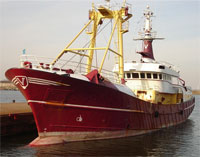 Peter Watson of Watson Trawlers in Whangarei, has a design philosophy I totally share. His company makes a very fine line of steel trawlers and he wrote a very clear article on the matter of classification. To learn more about truly oceangoing trawlers yachts, visit his website www.realtrawlers.com
Peter Watson of Watson Trawlers in Whangarei, has a design philosophy I totally share. His company makes a very fine line of steel trawlers and he wrote a very clear article on the matter of classification. To learn more about truly oceangoing trawlers yachts, visit his website www.realtrawlers.comby Peter Watson
The classification societies are curious institutions. They are non-profit non-governmental incorporated societies who publish rules, standards, guides and other criteria for the design and construction of marine vessels of all kinds. They review designs and carry out surveys during construction to verify compliance with such rules. They issue certificates of survey on completion if the vessel has been built in accordance with their Rules and Regulations. Governments also grant them powers to issue Loadline, Tonnage and Safety Certificates for Merchant Shipping of all kinds operating in their Registry.
The principal Classification Societies that issue rules for Motor Yachts are:
- ABS – American Bureau of Shipping
- L.R. – Lloyds Register of Shipping
- BV – Bureau Veritas
 Each of these societies publishes Motor Yacht Rules for construction in steel, aluminum, GRP and wood. These Rules and Regulations have been developed over more than 100 years of trial and error, research and statistical analysis. They provide a good guide to designers and builders for design and construction even though it may not be intended to be “class” the vessel. It is from these Rules that we shall base our comments on Subdivision and Watertightness. Structural Strength, Machinery and Electrical Installation, Steering Gear and Equipment Installation.
Each of these societies publishes Motor Yacht Rules for construction in steel, aluminum, GRP and wood. These Rules and Regulations have been developed over more than 100 years of trial and error, research and statistical analysis. They provide a good guide to designers and builders for design and construction even though it may not be intended to be “class” the vessel. It is from these Rules that we shall base our comments on Subdivision and Watertightness. Structural Strength, Machinery and Electrical Installation, Steering Gear and Equipment Installation.
The decision to build to class should be made at the design stage because, from our experience, obtaining a class certificate after construction (CAC) is a very difficult proposition and at best the certificate will be a slightly inferior class.
What are the advantages of classification?
For the owner classification has great benefits.
- He can be certain that the vessel has been built to a recognized standard by properly certified personel after plan approval.
- The hull materials will be of an approved and certified type.
- The Classification certificate will be recognized by insurance companies and will result in lower premiums.
- The resale value of the vessel will be enhanced.
What are the disadvantages of classification?
- The build cost is higher.
- Annual fees are payable.
- The vessel is required to have annual surveys.
- The vessel has to be dry-docked every 2 1/2 years for a full underwater survey.
What class notations are available? The Classification Societies are reluctant to grant full Class notations to private motor yachts under about 78ft mainly because it is not economic for them to do so. They will however undertake plan approvals, survey the vessel during construction and issue a letter of attestation on completion stating that the vessel has been built according to their Rules and Regulations. There are no further surveys or fees payable after this time. If subsequent to this the owner converts the vessel to “ply for hire” or for other commercial purposes a classification certificate can be applied for based on the original letter of attestation. . It should also be borne in mind that if owners have future intentions of chartering their vessels many Government regulations are also applicable which are outside of the scope of degree of class mentioned. All these need to be considered at the design stage.
The Classification Societies are reluctant to grant full Class notations to private motor yachts under about 78ft mainly because it is not economic for them to do so. They will however undertake plan approvals, survey the vessel during construction and issue a letter of attestation on completion stating that the vessel has been built according to their Rules and Regulations. There are no further surveys or fees payable after this time. If subsequent to this the owner converts the vessel to “ply for hire” or for other commercial purposes a classification certificate can be applied for based on the original letter of attestation. . It should also be borne in mind that if owners have future intentions of chartering their vessels many Government regulations are also applicable which are outside of the scope of degree of class mentioned. All these need to be considered at the design stage.
For vessels over 78ft we recommend that a full Classification Certificate be obtained. For example our W79 Trawler Yacht is delivered with the following class notation:
Bureau Veritas - I 3/3E YACHT-/s ·MACH STB
- I 3/3E: indicates the hull is designed and built to the highest BV standards applicable.
- E: means the equipment (anchors and cable) meets the applicable requirements of the rules.
- YACHT-/s: indicates the service notation and hull material (steel).
- MACH: means the vessel machinery has type approval and is installed to BV satisfaction.
- STB: an inclining experiment has been carried out on the completed vessel and stability file prepared and approved.
In addition to the above it is well worth considering for vessels over 78ft, obtaining M.C.A certification. This certificate will allow the vessel to be chartered from Red Ensign States and thereby greatly enhance eventual saleabililty.
In conclusion it can be seen that some degree of class approval is beneficial for an owner of a trawler yacht and should be seriously considered. Beware of vessels advertised as “built to Lloyds Rules” or similar statement as this is a misleading and meaningless term. Few vessels built without plan approval and inspection during construction would be able to pass the rigorous classification process.


No comments:
Post a Comment